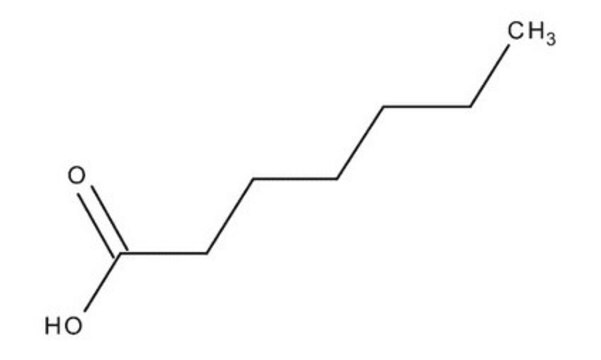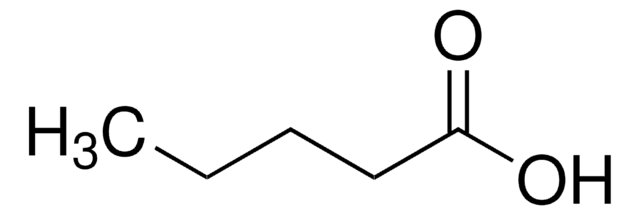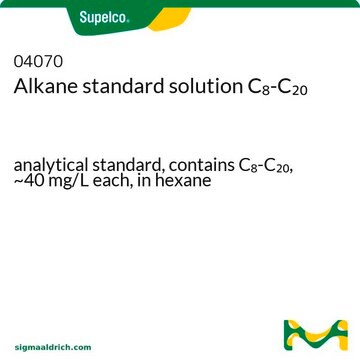146870
Heptanoic acid
96%
Synonym(s):
Enanthic acid, Oenanthic acid
About This Item
Recommended Products
vapor density
4.5 (vs air)
Quality Level
vapor pressure
<0.1 mmHg ( 20 °C)
Assay
96%
form
liquid
expl. lim.
10.1 %
refractive index
n20/D 1.4221 (lit.)
bp
223 °C (lit.)
mp
−10.5 °C (lit.)
solubility
water: soluble 0.2419 g/100ml at 15 °C
DMF: soluble
DMSO: soluble
diethyl ether: soluble
ethanol: soluble
density
0.918 g/mL at 25 °C (lit.)
SMILES string
CCCCCCC(O)=O
InChI
1S/C7H14O2/c1-2-3-4-5-6-7(8)9/h2-6H2,1H3,(H,8,9)
InChI key
MNWFXJYAOYHMED-UHFFFAOYSA-N
Looking for similar products? Visit Product Comparison Guide
General description
Application
Signal Word
Danger
Hazard Statements
Precautionary Statements
Hazard Classifications
Acute Tox. 4 Inhalation - Eye Dam. 1 - Skin Corr. 1B - STOT SE 3
Target Organs
Respiratory system
Storage Class Code
8A - Combustible corrosive hazardous materials
WGK
WGK 1
Flash Point(F)
235.4 °F - closed cup
Flash Point(C)
113 °C - closed cup
Personal Protective Equipment
Regulatory Listings
Regulatory Listings are mainly provided for chemical products. Only limited information can be provided here for non-chemical products. No entry means none of the components are listed. It is the user’s obligation to ensure the safe and legal use of the product.
PDSCL
Deleterious substance
FSL
Group 4: Flammable liquids
Type 3 petroleums
Hazardous rank III
Water insoluble liquid
ISHL Indicated Name
Substances Subject to be Indicated Names
ISHL Notified Names
Substances Subject to be Notified Names
JAN Code
146870-1L:
146870-BULK:
146870-VAR:
146870-100ML:4548173356563
146870-250ML:
146870-500ML:
Choose from one of the most recent versions:
Already Own This Product?
Find documentation for the products that you have recently purchased in the Document Library.
Customers Also Viewed
Our team of scientists has experience in all areas of research including Life Science, Material Science, Chemical Synthesis, Chromatography, Analytical and many others.
Contact Technical Service











